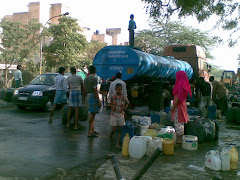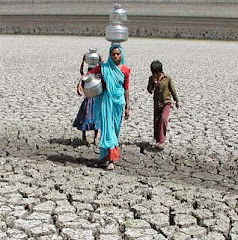India's groundwater resources are vanishing. And, at a rate that is being considered far too dangerous for a country which has perhaps the highest rates of extraction of groundwater.
Agriculture remains the major recipient of groundwater.
The Indian government is now thinking of bringing in a cap and a tax on groundwater usage so that its indiscriminate use for irrigation is discouraged. The move is expected to help preserve the fast depleting groundwater levels across the country.
The Planning Commission is working on a new groundwater bill and water framework law for the Twelfth Five-Year Plan period that begins next year. The bill is expected to include several other sweeping changes to arrest the decline in groundwater levels.
Planning Commission Member Mihir Shah recently made a presentation to Prime Minister Manmohan Singh in which he suggested that without legal reform, "mining of groundwater will be impossible to control".
Over-extraction of groundwater has lowered the water table to dangerous levels across several states, the mid-term appraisal report of the Eleventh Five-year Plan has warned.
Last year, a World Bank report too had also warned that overexploitation of groundwater in India was rampant and 60 per cent of all aquifers in the country could run dry in 20 years or will be in a critical condition.
A Central law that regulates groundwater usage is much needed. But, it will not be an easy task. There are several laws governing water in India. And, water remains a state subject too.
Political compulsions could undermine a move to bring harmony on this front. But, a beginning has to be made.
ON its part, Planning Commission has suggested that a National Water Commission, a central regulator monitoring investment clearances for water projects, should be set up to affectively gauge and incentivize state compliance.
Some states are already charging for irrigation from canals and dams and use the money for maintenance work. But, groundwater usage remains largely out of tax ambit in several states.
Thursday, April 21, 2011
Tuesday, April 12, 2011
Jharkhand ropes in private sector to manage drinking water supply
After Delhi indicated last month that it would rope in the private sector to help get over it water woes, it is the turn of India's eastern state of Jharkhand to bring in the private sector to manage supply of drinking water.
The state announced earlier this month that it has entered into an agreement with a Mumbai-based company under the public private partnership mode for the same.
The private company that has been engaged by the state is expected to ensure water supply and levying of proper charges for the water consumed.
The entire state is reeling under a severe water crisis as most of the major rivers - Koel, Shankh, Swarnarekha, Paras and Dewaki - are running dry. Also, the state has not received adequate rainfall for past two years and has been declared drought-hit six out of the past 10 years.
The time is right to involve the private sector, but already some doubts have been raised by none other than the state's top bureaucrat. Jharkhand's new Chief Secretary S K Choudhary is unsure of the viability of the PPP scheme.
He has reportedly said that the state drinking water and sanitation department (DWSD) should go for a pilot project first before implementing the scheme in the state capital. The scheme was either likely to make water unavailable or make it costlier to poor people, it is being felt.
The civil servant feels that mere rules and regulations would not solve the water crisis unless there was a general awareness about water conservation.
No doubt, the thinking is in the right direction. But, does that mean that the private sector cannot bring in its expertise to resolve long-standing water problems in the state. For too long, the state's people have suffered.
Jharkhand could look around and see how some of the states that have brought in the private sector have progressed.
The state announced earlier this month that it has entered into an agreement with a Mumbai-based company under the public private partnership mode for the same.
The private company that has been engaged by the state is expected to ensure water supply and levying of proper charges for the water consumed.
The entire state is reeling under a severe water crisis as most of the major rivers - Koel, Shankh, Swarnarekha, Paras and Dewaki - are running dry. Also, the state has not received adequate rainfall for past two years and has been declared drought-hit six out of the past 10 years.
The time is right to involve the private sector, but already some doubts have been raised by none other than the state's top bureaucrat. Jharkhand's new Chief Secretary S K Choudhary is unsure of the viability of the PPP scheme.
He has reportedly said that the state drinking water and sanitation department (DWSD) should go for a pilot project first before implementing the scheme in the state capital. The scheme was either likely to make water unavailable or make it costlier to poor people, it is being felt.
The civil servant feels that mere rules and regulations would not solve the water crisis unless there was a general awareness about water conservation.
No doubt, the thinking is in the right direction. But, does that mean that the private sector cannot bring in its expertise to resolve long-standing water problems in the state. For too long, the state's people have suffered.
Jharkhand could look around and see how some of the states that have brought in the private sector have progressed.
Subscribe to:
Posts (Atom)

.jpg)


